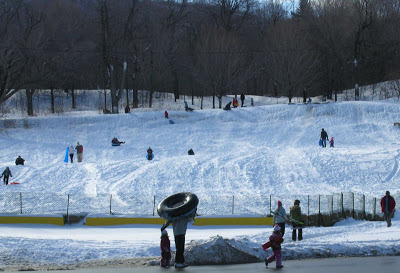Mary Soderstrom's Blog, page 92
February 14, 2013
Happy Valentine's Day, Non-commercially
 This is not the first time that I've used this photo as a card, but, what the heck!, I like it.
This is not the first time that I've used this photo as a card, but, what the heck!, I like it.It also has the advantage of being one I took myself some time ago, and so I'm not doing the consumer thing when I use it.
The former was written after being deluged with a lot of Valentine publicity. Anything to sell something....
Published on February 14, 2013 10:59
February 13, 2013
You're Known by the Company You Keep: Justin Trudeau and Patrick Brazeau
 Now that Patrick Brazeau has been more or less turfed out of the Senate for very ungentlemanly behavior, it's time to reflect on the boxing match he lost to Justin Trudeau.
Now that Patrick Brazeau has been more or less turfed out of the Senate for very ungentlemanly behavior, it's time to reflect on the boxing match he lost to Justin Trudeau.Okay, it was for charity, and that's supposed to make it easier to forgive. By Holy Toledo! what's an MP going up against a Senator in a boxing match for? Grandstanding, publicity chasing, sheer stupidity.
And young Trudeau is going to be the next Liberal leader? These two young men are terminably immature, and Canadian public life can do very welll without them, thank you very much.
Published on February 13, 2013 09:50
February 11, 2013
Faith and Facts: Where to Draw the Line?
Interesting juxtaposition in the news today: the Roman Catholic pontiff steps down, Stephanie Nolen writes about the biggest religious event in the world and Paul Krugman's column is about "The Ignorance Caucus."
Thirty million people bathing in the Ganges where it meets the Yamuna river and the mythical Sarswati believe that they are washing away their sins of this life. That the water is polluted does not matter to them, any more than the shadow of ritual cannablism that falls on the Last Supper makes the Eucharist suspect in the eyes of Christians.
People should be allowed to have faith in the importance and effectiveness of these rites, I suppose. But religious beliefs should not affect our attempts at intellectual inquiry. Yet, as Krugman points out, in the US (and iincreasingly in Canada) "One side believes, at least in principle, in letting its policy views be shaped by facts; the other believes in suppressing the facts if they contradict its fixed beliefs."
Climate change research is the most flagrant current example--Krugman notes that Virginia, one of the US states most in danger of coastal flooding, has reluctantly agreed to study growing risk but Republicans in the State Legislature have specifically prohibited the use of the words “sea-level rise.”
Shades of Galileo...
Thirty million people bathing in the Ganges where it meets the Yamuna river and the mythical Sarswati believe that they are washing away their sins of this life. That the water is polluted does not matter to them, any more than the shadow of ritual cannablism that falls on the Last Supper makes the Eucharist suspect in the eyes of Christians.
People should be allowed to have faith in the importance and effectiveness of these rites, I suppose. But religious beliefs should not affect our attempts at intellectual inquiry. Yet, as Krugman points out, in the US (and iincreasingly in Canada) "One side believes, at least in principle, in letting its policy views be shaped by facts; the other believes in suppressing the facts if they contradict its fixed beliefs."
Climate change research is the most flagrant current example--Krugman notes that Virginia, one of the US states most in danger of coastal flooding, has reluctantly agreed to study growing risk but Republicans in the State Legislature have specifically prohibited the use of the words “sea-level rise.”
Shades of Galileo...
Published on February 11, 2013 06:13
February 10, 2013
Saturday Photo: Sledding, again
Published on February 10, 2013 14:14
February 8, 2013
January Is a Cruel Month: the Carpe Diem Files
Four friends lost parents in January. All of the deceased were in their 80s or older--and one, our neighbor Mary Macdonnel Bélisle, was 106.
My mother, whose birthday was in January, always said that it was a terrible month, not only because the weather and the length of daylight are so depressing, but also because, with its 31 days, it seems interminable.
The end comes to everything, though, and, even though the deaths of this quartet were not unexpected, the sadness and loss are very real. I am sorry that we never knew Mary Bélisle before she began to decline--she moved back into the house of her childhood only about 7 years ago--because it's quite clear she was a woman of substance. She entered McGill in 1924 at a time when there were few women students, took honours in English and French, taught high school for years, and then at 37 married and had four children who do her and her husband Alfred, who kept a general store in the small town of Lebel in the Laurentians north of Montreal, immense credit. Apparently she read The Economis t well into her 90s and knew reams of Shakespeare and other literary greats.
The days are longer now: it was growing light before 6 a.m. this morning, and the sun will not set until after 5 p.m. That lifts the spirits. But we almost must realize that, while days will continue without number, we will not. I coming to think that we must live each day as something precious and strive to leave a world that is no worse than the one we were born into--and perhaps a bit better.
My mother, whose birthday was in January, always said that it was a terrible month, not only because the weather and the length of daylight are so depressing, but also because, with its 31 days, it seems interminable.
The end comes to everything, though, and, even though the deaths of this quartet were not unexpected, the sadness and loss are very real. I am sorry that we never knew Mary Bélisle before she began to decline--she moved back into the house of her childhood only about 7 years ago--because it's quite clear she was a woman of substance. She entered McGill in 1924 at a time when there were few women students, took honours in English and French, taught high school for years, and then at 37 married and had four children who do her and her husband Alfred, who kept a general store in the small town of Lebel in the Laurentians north of Montreal, immense credit. Apparently she read The Economis t well into her 90s and knew reams of Shakespeare and other literary greats.
The days are longer now: it was growing light before 6 a.m. this morning, and the sun will not set until after 5 p.m. That lifts the spirits. But we almost must realize that, while days will continue without number, we will not. I coming to think that we must live each day as something precious and strive to leave a world that is no worse than the one we were born into--and perhaps a bit better.
Published on February 08, 2013 06:46
February 6, 2013
Hart House Viols in Concert on Saturday: Not to Be Missed
 Elin is in Toronto this week preparing for a concert in the Scaramella series where she and three other musicians will play fabulously old viola da gambas
Elin is in Toronto this week preparing for a concert in the Scaramella series where she and three other musicians will play fabulously old viola da gambas Saturday, February 9, 2013, 8:00 p.m., at Victoria Chapel
Six instruments now at Hart House at the University of Toronto were acquired in 1919 for $1,500 at a Toronto antique dealers, and spent most of the following 90 years being played infrequently. Their value and quality was recognized early in this century as interest in the viola da gamba and its repertoire flowered.
Two of them will be played on Saturday along with two others now in private ownership: the quarter is composed of instruments made by John Pitts (1675), Edward Lewis (1680s), John Rose (c1590) and Henry Jaye (1615.
Here are the details:
Hartes Ease
Saturday, February 9, 2013, 8:00 p.m., at Victoria Chapel
In tribute to Wolfgang and Maria Grunsky (early music pioneers, and two of the very first viol players in Toronto), Elizabethan and Stuart viol consort repertoire is presented entirely on original instruments by English luthiers of that period, including Wolfgang’s bass viol (Edward Lewis, c1690), plus two of the spectacular viols from the Hart House collection, purchased and brought to Toronto in 1919 by a collective of individuals led by Vincent Massey. Not to be missed, these instruments are as lovely to the eye as they are to the ear.
Marie Dalby Szuts, Elin Söderström, Liam Byrne and Joëlle Morton,
Published on February 06, 2013 07:21
February 4, 2013
Even the Conference Board Warns about Income Inequality
A new Conference Board of Canada report should be an eye-opener to those who think that high unemployment and changes in the EI rules that will penalize seasonaal workers are nothing to worry about.
"Canada places 7th and gets a “B” grade in the Society report card. Despite the solid performance, high rates of poverty and a large gap in income between the rich and everyone else put stress on a society and on the economy. Rising poverty rates and greater income inequality can mean a weakening in labour force attachment and social cohesion."
(Emphasis added.)
Who comes in first? The usual suspects: Denmark, Norway, Sweden, Holland, Finland and Austria, in that order. The US is 17th: Paul Krugman would understand.
(BTW, my intention had been to stop blogging regularly here, but obviouslyl I can't, not when there are interesting things to point out. So stay tuned: there may not be new material everyday, but there will be frequently...)
"Canada places 7th and gets a “B” grade in the Society report card. Despite the solid performance, high rates of poverty and a large gap in income between the rich and everyone else put stress on a society and on the economy. Rising poverty rates and greater income inequality can mean a weakening in labour force attachment and social cohesion."
(Emphasis added.)
Who comes in first? The usual suspects: Denmark, Norway, Sweden, Holland, Finland and Austria, in that order. The US is 17th: Paul Krugman would understand.
(BTW, my intention had been to stop blogging regularly here, but obviouslyl I can't, not when there are interesting things to point out. So stay tuned: there may not be new material everyday, but there will be frequently...)
Published on February 04, 2013 07:07
February 3, 2013
Saturday Photos: Two fromt the Past, One from the Present
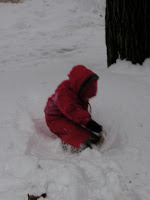 I dug out two pictures of Lukas and Elin, aged about 5 and 9, playing in the snow in front of our house this week to show Jeanne. She wasn't nearly impressed as she was by the snow itself that she's shown playing in.
I dug out two pictures of Lukas and Elin, aged about 5 and 9, playing in the snow in front of our house this week to show Jeanne. She wasn't nearly impressed as she was by the snow itself that she's shown playing in.Nice to see that having fun with the white stuff continues to be a joy to young folks.
And with that, I think I'll sign off for a while. This blog takes a lot of time, which I realized I dont' have much of right now. I'll continue to post, but only when someting cries out to be noticed. Until this, go play outside yourself!
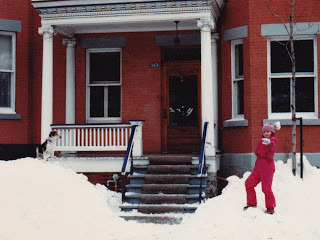
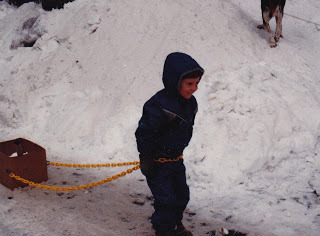
Published on February 03, 2013 10:46
February 1, 2013
Seven Years to Walk Humankind's History: Paul Salopek's Excellent Project
Just came across a fascinating adventure that will retrace (more or less) humankind's trek out of Africa and around the world. Writer Paul Salopek is calling it "Out of Eden:" he proposes to begin this year in Ethopia and trek into the Middle East and beyond, crossing Eurasia, grabbing a boat across part of the Bering Strait and then going south all the way to Patagonia.
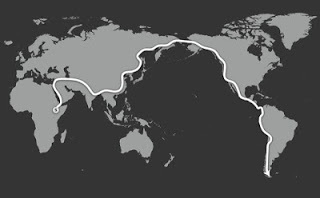 The adventure will take seven years, and he'll be writing stories for magazines along the way. The first of his regular blog entries was made 10 days ago as he set off from Herto Bouri, Ethiopia, 10°17'12'' N, 40°31'55'' E.
The adventure will take seven years, and he'll be writing stories for magazines along the way. The first of his regular blog entries was made 10 days ago as he set off from Herto Bouri, Ethiopia, 10°17'12'' N, 40°31'55'' E.
Salopek explains: "It is a hegira across 2,500 human generations. Across 22,000 miles of our planet’ssurface. And across seven years of my life. Far from being a stunt, it is a seriousnarrative project that draws together all the strands of my experience as a traveler and a journalist—innumerable journeys to among distant rivers, mountains and highways, plus a background in natural science—and braids them into the ultimate story of us: an “assignment” in the spirit of Herodotus, or of the medieval Islamic traveler Ibn Battuta. Alternating between deep history and the cacophony of contemporary life that I’ll encounter along the trail, it is, in sum, a very long walk into our becoming."
Wow! There may be a little hyperbole in there, but the idea is something I wish I'd thought of when I was young and unattached. You can be sure, I'll be following Salopek's reports with interest.
 The adventure will take seven years, and he'll be writing stories for magazines along the way. The first of his regular blog entries was made 10 days ago as he set off from Herto Bouri, Ethiopia, 10°17'12'' N, 40°31'55'' E.
The adventure will take seven years, and he'll be writing stories for magazines along the way. The first of his regular blog entries was made 10 days ago as he set off from Herto Bouri, Ethiopia, 10°17'12'' N, 40°31'55'' E.Salopek explains: "It is a hegira across 2,500 human generations. Across 22,000 miles of our planet’ssurface. And across seven years of my life. Far from being a stunt, it is a seriousnarrative project that draws together all the strands of my experience as a traveler and a journalist—innumerable journeys to among distant rivers, mountains and highways, plus a background in natural science—and braids them into the ultimate story of us: an “assignment” in the spirit of Herodotus, or of the medieval Islamic traveler Ibn Battuta. Alternating between deep history and the cacophony of contemporary life that I’ll encounter along the trail, it is, in sum, a very long walk into our becoming."
Wow! There may be a little hyperbole in there, but the idea is something I wish I'd thought of when I was young and unattached. You can be sure, I'll be following Salopek's reports with interest.
Published on February 01, 2013 11:04
January 31, 2013
An interesting development in the film forum NPD Ourtremo...
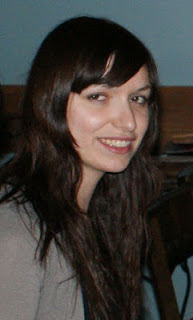 An interesting development in the film forum NPD Ourtremont is organizing for next Monday, February 4: Widia Larivière of Femmes Autochtone du Québec and Idle No More will be on hand to discuss
The People of the
Kattawapiskak
River.
An interesting development in the film forum NPD Ourtremont is organizing for next Monday, February 4: Widia Larivière of Femmes Autochtone du Québec and Idle No More will be on hand to discuss
The People of the
Kattawapiskak
River.
For complete information: https://www.facebook.com/events/427786350625943/
Published on January 31, 2013 11:40

